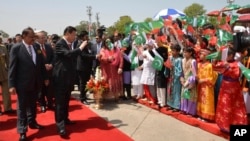As the Chinese president’s visit to Pakistan ended, analysts said it was being viewed in Washington with one goal in mind: stability in Pakistan and the region.
President Xi Jinping’s visit to Pakistan this week came as the United States has begun its drawdown from Afghanistan, and as more pressing international issues from Yemen to Ukraine take priority.
“U.S. interests in Pakistan and the region are very similar to those of China,” said Michael Kugelman, senior program associate for South and Southeast Asia at the Woodrow Wilson International Center for Scholars in Washington. “Just like China, it also wants to promote more economic development and stability in Pakistan and the broader region.”
Some analysts believe Pakistan presents a rare opportunity for China and the U.S. to work together.
Disengagement from region
The U.S. has reacted with concern about China’s reclamation of islands in the South China Sea, which are claimed by several countries.
On the economic side, the U.S. has been wary about the China-led Asian Infrastructure Investment Bank and the challenge it could pose to current global systems such as the World Bank and the International Monetary Fund. Fifty-seven countries, including U.S. allies such as Britain, Germany and France, have joined the bank as founding members.
“For America, a rising China is no longer business as usual. … The U.S. sees a rival that is growing in strength and competing for political, diplomatic and security policy space in Asia,” said Kevin Rudd, a former Australian prime minister and president of the Asia Society Policy Institute.
But analysts say the rivalry is different when it comes to Pakistan.
The U.S. has spent almost $1 trillion on the Afghanistan war; the longest overseas conflict by the U.S., according to a Financial Times report. It has nearly 10,000 troops still in Afghanistan, but that is far below the peak of more than 100,000 troops in 2011, and it is still expected that an exit will be completed by 2017.
Amid this disengagement from the region, the Chinese leader’s visit brought close to $46 billion in infrastructure and energy projects for Pakistan.
“We’re not going to be putting that kind of investment in [Pakistan]. … We’re not stepping up, we’re stepping back,” said Marvin Weinbaum, who served as an analyst on Pakistan and Afghanistan in the State Department and is currently a scholar-in-residence at the Washington-based Middle East Institute.
The U.S. pledged more than $30 billion in “direct aid” from 1948 to 2013 for Pakistan, according to a Congressional Research Service report. Much of it was in the post-2001 era when Pakistan became an important country in the fight against terrorism.
With U.S. influence in Pakistan likely to diminish, it is important that China step in to fill the gap, Weinbaum said.
“This is the reality. ... There is not much the U.S. can do,” he added.
Kugelman, of the Wilson Center, said that while there are “China hawks” in Washington who oppose any growth in China's influence, there also is an acceptance that it is a key player in the region.
He added that in addition to stability in the region, the U.S. is promoting economic integration, and because the level of investment is not possible by the U.S alone, Washington is accepting China’s role.
At the same, analysts believe Washington and Beijing agree on the need for Pakistan to continue fighting terrorism.
According to Andrew Small, a trans-Atlantic fellow at the German Marshall Fund and author of “The China-Pakistan Axis: Asia’s New Geopolitics,” Pakistan’s recent military operation had Chinese concerns in mind.
“The operation that the Pakistani army launched in North Waziristan, Zarb-e-Azb, I think, was partly conceived with the East Turkestan Islamic Movement [in mind],” Small said. He was referring to a group that is seeking independence for the Xinjiang region in China, home to a sizable Muslim population.
“We do not view this as a theater of competition. We have a shared set of interests in keeping peace, stability and ultimately economic prosperity,” a State Department official told VOA earlier.
U.S. interests remain
Despite the growing influence of China, the U.S. still has vital interests in Pakistan, from ensuring the safety of its nuclear weapons to ensuring that relations with neighboring India do not destabilize the region.
In a recent interview with National Public Radio, a former Pakistani ambassador to the U.S., Sherry Rehman, said the U.S. is likely to have learned lessons from the past and is not likely to be “completely averting its gaze from the region.”
Small, of the German Marshall Fund, said there is some sensitivity that Washington may have with Xi’s recent visit to Pakistan and the broader China-Pakistan relations.
One of the cornerstones of China’s investment in Pakistan is the China Pakistan Economic Corridor that would connect China to Pakistan’s strategically important seaport of Gwadar.
While the port would allow China to be directly connected to the Indian Ocean, a major shipping corridor, Small said there could be concern in Washington about its “dual use on the military side.”
At the same time, he added, there is some concern about China's and Pakistan’s civilian nuclear cooperation, including a deal in which China has been helping Pakistan construct a nuclear power project in Karachi.
While China is a member of the Nuclear Supplies Group and, as a result, is not allowed to transfer such technology to nonsigners, it argues that it made the commitment to Pakistan before joining the group.
“China’s expanding civilian nuclear cooperation with Pakistan raises concerns, and we urge China to be transparent regarding this cooperation,” the U.S. Embassy said in a statement, according to The Washington Post.
Despite these challenges, some foreign policy experts say Xi’s visit to Pakistan at least partly aligns with Washington’s goals.
“The economic incentives that China is giving Pakistan to stabilize its relationship with its neighbors … [and] the broader security benefits in the region from a U.S. perspective” would outweigh the concerns, Small said.









